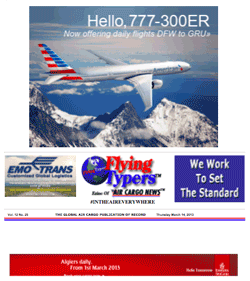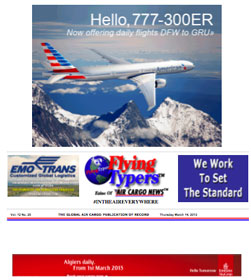 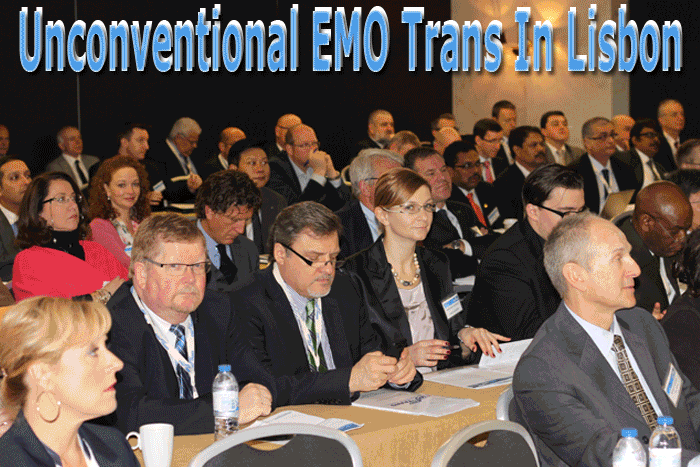
|
|
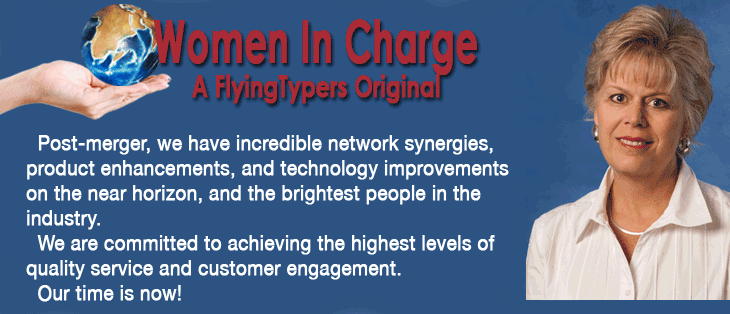 |

“Last
year was a challenging one for both
United Cargo and the cargo industry.
“In
2012, United Cargo harmonized our products
and processes, transitioned to a single
air waybill and moved our capacity and
customer accounts onto a single technology
system.
“Among
the goals for 2013 is to regain and
grow our market share by reducing service
failures and restoring our customers’
confidence, improving our product offering
and the quality of our customer service,
and realizing the synergies of our merged
network and cargo business.
“One
thing that surprised me in 2012 was
the amount of over-capacity in the cargo
marketplace. Despite weak demand, there
were new freighters entering markets
where you’d expect carriers to
be pulling out. Our industry doesn’t
have an exemption from the law of supply
and demand, so this excess capacity
resulted in the expected downward pressure
on rates and yields.”

Peggy
Guse oversees the critical post as United
Cargo Sales Strategy, Marketing and
Customer Service.
In addition to being very bright, Peggy
remains approachable despite the weight
of her job. Peggy is responsible for
developing and implementing sales strategy
for United Cargo's worldwide sales organization.
Peggy
also oversees United Cargo’s product
development, advertising, and direct
customer service, and supports efforts
through the carriers’ two customer
service centers.
Her responsibilities
also include government, interline,
and specialty sales.
Prior
to joining United Cargo, Peggy held
positions in United’s Contact
Center Strategy and Sales Strategy groups.
She has
held management positions in the car
rental, hotel, and travel agency segments
of the industry—including three
years as Vice President of Sales Strategy,
Communication, and Staff Development
for a major global travel organization.
Just like
many high-powered executives today,
Peggy studied Finance at the University
of Illinois, where she earned her BS.
“I’ve
been in the travel industry 26 years
and have been fortunate to enjoy wide-ranging
experience in the airline, hotel, car
rental, and agency segments.
“It
wasn’t until I joined United six
years ago that cargo piqued my interest.
“I
was drawn to the hidden opportunities
in air cargo that are often overshadowed
by the passenger side of the business.
“I’m
still a relative newcomer on the highly-tenured
United Cargo team.
“But
in my two years, I’ve become convinced
there’s even more hidden opportunity
in air cargo than I originally thought.
“This
is truly a fascinating business and
I’ve only scratched the surface
of what there is to learn.”

“To
be honest, I don’t really think
about ‘men versus women’
in the workplace.
“For
me, it’s more about capabilities
rather than gender.
“I’ve
certainly heard it said that ‘cargo
is a man’s world,’ but there’s
no benefit in dwelling on that concept.
“I’d
rather ignore all the stereotyping and
just focus on the available opportunities—and
there are plenty of opportunities to
go around!
“I’ve
been married for 20 years, and work/life
balance has always been a challenge.
“Like
most of my peers, a 40-hour week is
only the beginning of my work commitment.
I’m extremely fortunate to have
a very understanding and supportive
husband.
“We
routinely compare our calendars for
the upcoming week on Sunday evening,
and try to find time to accommodate
a personal life between work demands.”

“Looking
ahead at what we all can do to improve
the business, the air cargo industry
needs to do a much better job of incorporating
advancements in technology.
“When
it comes to utilizing technology, we’re
behind the times.
“Whether
it’s performance management tools,
facility scanners or website bookings
(to cite just a few examples), cargo
can learn a lot from other industries—and
even from the passenger side of the
airline industry.”

You talk
to Peggy Guse about where she wants
to deliver United Cargo and can’t
help but wonder where all this drive,
perseverance, imagination, and excitement
for the job took wing.
Peggy
won’t back down, and handles that
query like a batter hitting a fastball
that has been thrown down the middle
of the plate—out of the park.
“While
most people are lucky enough to have
a mentor who impacted their career development,
I’m more fortunate than most.
My mentor is a very unique individual
who has influenced every stage of my
development: my Dad.
“He’s
not an airline guy or even a travel
industry veteran.
“He’s
spent his life building an employee-owned
and family-run retail business.
“I
think the values and attitudes Dad instilled
in me would work in any position or
industry. Dad told me early in life:
“‘The
harder you work, the luckier you get,’
and experience has proven that to be
true.
“Another
of his principles I try to remember
and apply is ‘Nothing’s
more important than integrity.’”

“At
United Cargo, I believe we need to re-focus
our energies on realizing the great
opportunities we have before us, and
especially on becoming easier to do
business with.
“Since
the merger, we’ve been concentrating
on integrating our cargo businesses
while clearing the resource, operations,
and technology hurdles along the way.
“Now
that the bulk of the integration work
is behind us, I think we need to direct
our attention more toward exploiting
our strengths and less on the hurdles
that remain.”

“UA
does a great job in putting some extremely
bright people in the chief executive
role.
“I
have no doubt that if the position was
open and a woman was the best person
for the job, United would not hesitate
to name a woman as chief executive.
“United
Cargo is poised to assume a position
of leadership in the air cargo industry.
“Post-merger,
we have incredible network synergies,
product enhancements, and technology
improvements on the near horizon, and
the brightest people in the industry.
“We
are committed to achieving the highest
levels of quality service and customer
engagement.
“Our
time is now!”
Geoffrey/Flossie

|
 |
|
|
Get
On Board Air Cargo News FlyingTypers |


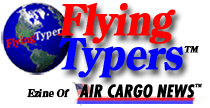
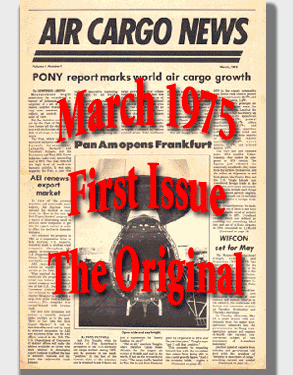
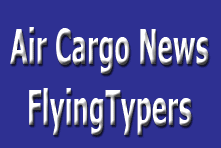
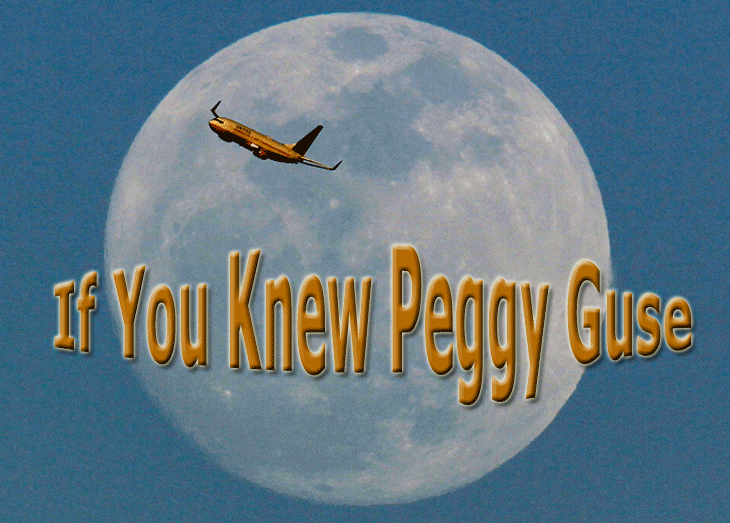
 sk
Peggy Guse, Director of United Cargo
Sales Strategy, Marketing and Customer
Service, what is new and deserves to
be shared with the global air cargo
business and her answer is immediate:
sk
Peggy Guse, Director of United Cargo
Sales Strategy, Marketing and Customer
Service, what is new and deserves to
be shared with the global air cargo
business and her answer is immediate:

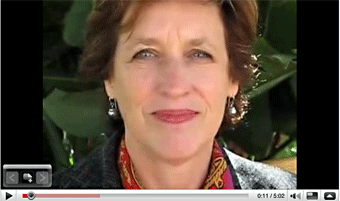
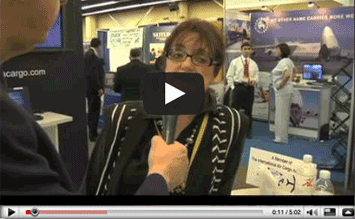
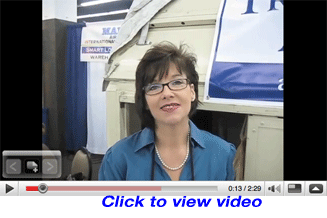
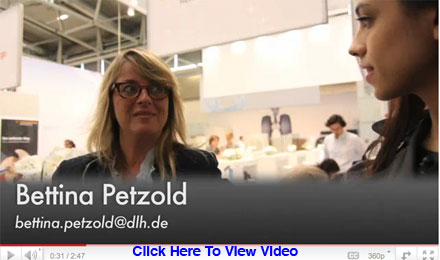
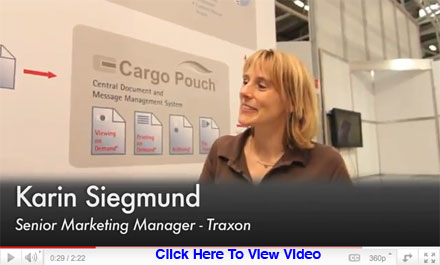

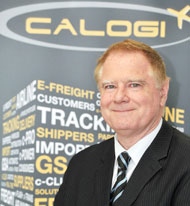
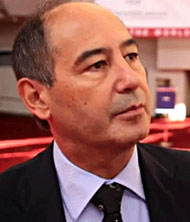 In
the opening session, Des Vertannes,
IATA Global Head of Cargo, outlined
the state of the industry, while summarizing
IATA Cargo’s priorities.
In
the opening session, Des Vertannes,
IATA Global Head of Cargo, outlined
the state of the industry, while summarizing
IATA Cargo’s priorities.  Another
piece of information from WCS: airline
yield, in real terms, has been falling
by an average of 4.2 percent per year
since 1999.
Another
piece of information from WCS: airline
yield, in real terms, has been falling
by an average of 4.2 percent per year
since 1999.  We
hear Lufthansa Cargo Charter Agency
made
money in 2012, but is being shut down
anyway.
It is better
than even money that MD
Reto Hunziker makes
a soft landing at
Chapman
Freeborn. As expected
and reported
We
hear Lufthansa Cargo Charter Agency
made
money in 2012, but is being shut down
anyway.
It is better
than even money that MD
Reto Hunziker makes
a soft landing at
Chapman
Freeborn. As expected
and reported 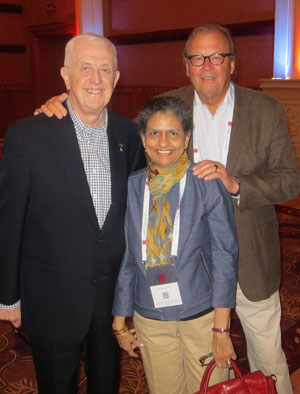 Cargo
Week 2013 . . . The best part of Cargo
Week in Doha, spending a couple of days
in Dubai, and then going to Lisbon is
being among all the wonderful people
that make up the air cargo business,
past and present.
Cargo
Week 2013 . . . The best part of Cargo
Week in Doha, spending a couple of days
in Dubai, and then going to Lisbon is
being among all the wonderful people
that make up the air cargo business,
past and present.
